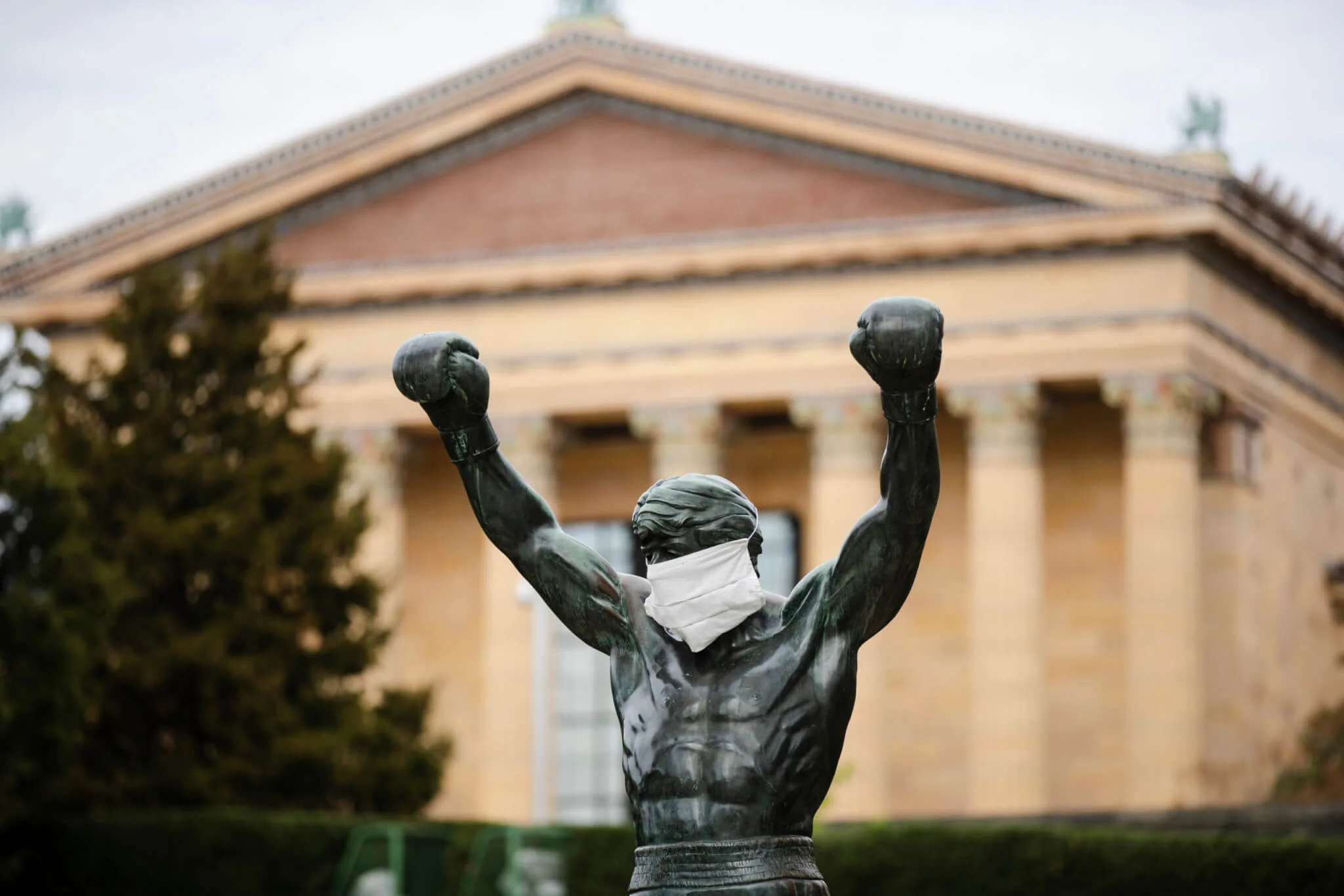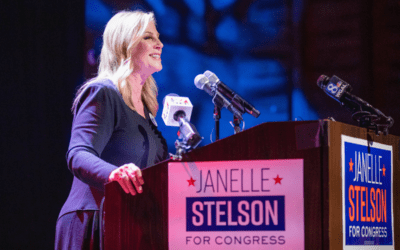
In this April 14, 2020, file photo the Rocky statue is outfitted with a mock surgical face mask at the Philadelphia Art Museum in Philadelphia. Philadelphia is banning indoor dining at restaurants and plans to shutter gyms, museums and libraries as the city battles a resurgence of the coronavirus, officials announced Monday, Nov. 16, 2020. (AP Photo/Matt Rourke, File)
State officials are leaving it up to local municipalities to set their own restrictions to help curb the spread of the novel coronavirus.
Gov. Tom Wolf and state Secretary of Health Dr. Rachel Levine have made one thing clear for weeks now: They want Pennsylvanians to “answer the call” when it comes to the coronavirus pandemic.
They repeatedly push personal responsibility as vital to stopping the spread of the virus, urging people to maintain social distancing standards, wear masks, wash their hands, and respond to contact tracers. They also continue advocating for the state’s municipalities and school districts to follow the state’s guidelines for staying open.
Levine continued the drumbeat of that narrative on Monday while sharing the state’s newest numbers: 9,675 new cases between Nov. 15 and 16 and 2,575 people currently hospitalized, and a total of 269,613 cases statewide and 9,325 deaths connected to the virus since March.
The numbers belie a simple fact: With few exceptions, Pennsylvania’s local governments and Pennsylvanians aren’t heeding Wolf’s and Levine’s call.
RELATED: PA Officials Urge Trump to Extend National Guard Coronavirus Support
Philadelphia is one of those exceptions.
On Monday, city officials announced that they are banning indoor dining at restaurants and indoor gatherings of any size, public or private, as the city battles a resurgence of the coronavirus. Outdoor dining will be permitted as long as the group is limited to four people who all live in the same household.
The city also plans to shutter gyms, museums, and libraries; prohibit in-person instruction at colleges and high schools; and reduce occupancy at stores and religious institutions, city health commissioner Dr. Thomas Farley said at a news conference Monday.
The new restrictions take effect Friday and extend at least through the end of the year.
Officials in Montgomery County, the state’s third most-populous county, last week ordered schools to go virtual after Thanksgiving.
Levine and Wolf are relying on local governments to make these types of calls. Levine said there are no plans to bring back the color-coded shutdowns from earlier in the pandemic, even though the number of people infected now is far greater than it was in the spring.
She repeatedly talked about the importance of local control in these decisions.
Levine said it’s important for local municipalities to work together and have similar reactions to the virus.
“It is useful if different communities and counties collaborate,” she said. “Some may do that and some may not.“
State Guidelines for Schools
“We do have specific guidance for schools,” Levine said. “We’re asking that schools follow that guidance.”
In August, the state Department of Education, working with the Department of Health, urged districts to take a tiered approach. If a county had a 7-day average of 10 or fewer cases out of 100,000 residents—or less than 5% positivity rate on tests—students could learn in the classroom. If a county was above that, but below 100 cases a day per 100,000 residents or had a 10% positivity rate, schools should be following a hybrid model. Counties that were above 100 cases per 100,000 residents and 10% positivity should be fully virtual.
Only eight of the state’s 67 counties—Cameron, Fayette, Forest, Pike, Sullivan, Susquehanna, Warren, Wayne—had a seven-day average below 100 cases per 100,000.

Montgomery County is the only one that has ordered its schools to go virtual. A few districts are going virtual on their own.
Contact Tracing
Another area where Pennsylvanians aren’t following Levine and Wolf’s recommendations is responding to contact tracing.
Levine has explained that the tracers need to be able to get accurate information from coronavirus patients.
However, the number of patients answering important questions is dropping.
On Nov. 9, Levine said that 71% of people did not answer all of the questions about whether or not they attended large or small gatherings or visited businesses in the previous 14 days.
That’s a drop from 50% answering the questions in mid-October, when Levine first started urging Pennsylvanians to respond to the calls.
The numbers are even lower now. Levine said just 16% are answering the question.
“Fewer and fewer people who test positive for the virus are fully cooperating with case investigators and contact tracers,” she said.
RELATED: PA Launches New Coronavirus Exposure Notification App
The Associated Press contributed to this report.

For Rep. Susan Wild, supporting PA families includes reproductive rights and much more
Rep. Susan Wild wants to be very clear with Pennsylvanians: Donald Trump is committed to taking away women’s reproductive freedom, but he is not...

School districts working with anti-LGBTQ groups can cost your kids’ schools millions
Parents across South Central Pennsylvania are worried about the potential financial impacts working with anti-LGBTQ groups may have on their school...

VIDEO: Trump distances himself from his anti-abortion views
Donald Trump appeared on WGAL on Tuesday and continued to distance himself from his anti-abortion views claiming that reproductive rights are now a...

VIDEO: Community pushback gets school board to rescind decision on denying gay actor’s visit
Cumberland Valley School Board offered a public apology and voted to reinstate Maulik Pancholy as a guest speaker a week after the board voted to...

VIDEO: Project 2025 brings nuclear armageddon back into vogue
Project 2025 is a titanic document, with plans ranging from cutting half of all government employees to targeting reproductive rights on a scale...




